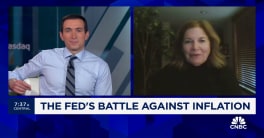Speaking on financial stability in London, Richmond Fed President Jeffrey Lacker (non-voter) said he called on the Fed to detail its rules on intervening in the financial markets in order to minimize moral hazard and greater risk taking.
"More expansive boundaries could conceivably prevent more avoidable liquidation costs in the case of non-fundamental runs, but in the case of fundamental runs more distortions would result. In addition, supervision itself is a costly endeavor, both in direct resource use and in the fallout effects on economic allocations," Lacker said.
"The danger is that the effect of recent credit extension on the incentives of financial market participants might induce greater risk taking, which in turn could give rise to more frequent crises, in which case it might be difficult to resist further expanding the scope of central bank lending," he added.
Lacker also aid that the Fed could contribute more to financial stability by fighting inflation which, after falling in February and March, has since stabilized.
On economic growth, Lacker maintained that the slowing U.S. economy should gradually recover over the next twelve months and return to its long-term trend by mid-2009.
Speaking to reporters, the central banker also said that monetary policy had become accommodative and that any interest hikes down the road would be dependent on incoming data.
By Erik Kevin Franco and edited by Nancy Girgis







